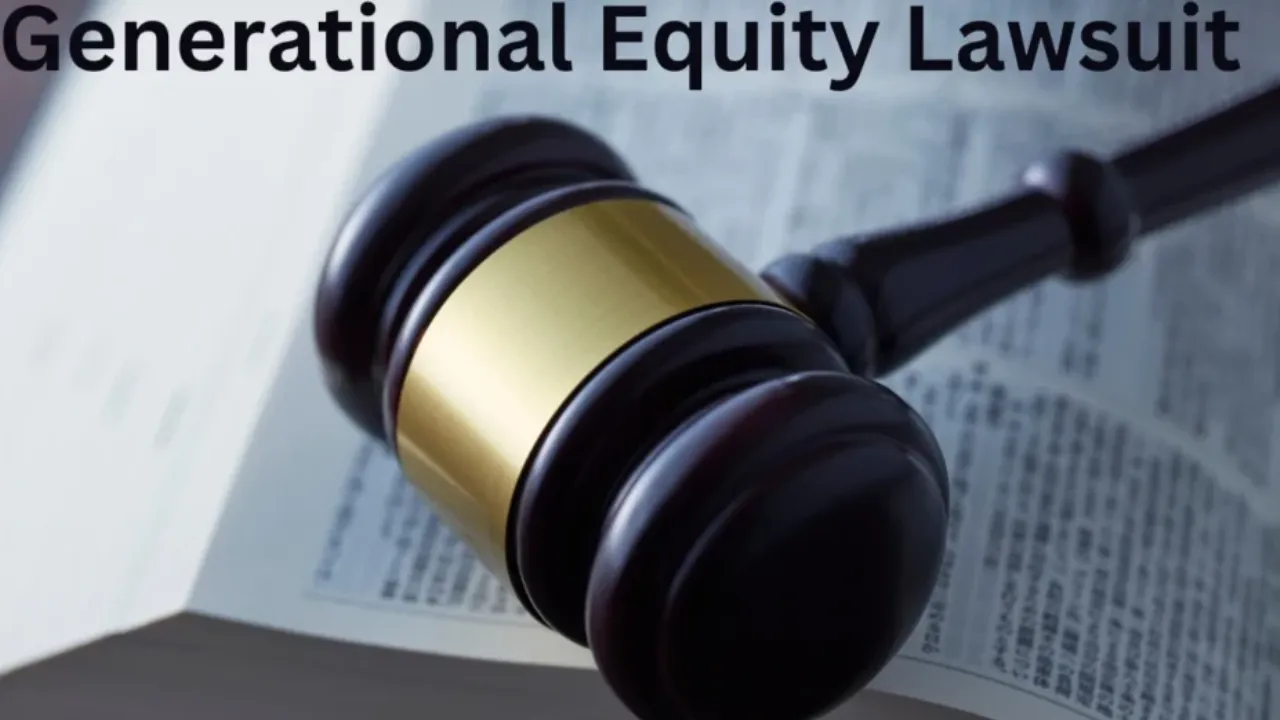Generational Equity Lawsuit A Fight for Fairness Across Ages

In recent years, the term generational equity lawsuit has caught public attention. It is more than a legal term—it is a fight for fairness between different generations. Whether in climate change cases or social security debates, these lawsuits highlight how today’s decisions affect future generations.
To begin with, generational equity means treating each generation fairly when it comes to wealth, debt, environment, and public resources. The generational equity lawsuit happens when one generation feels that laws or policies are unfairly hurting them compared to others. These lawsuits are now shaping legal systems in powerful ways, from youth-led climate action to pension reform cases.
If you’re trying to understand such cases in a simple way, ProgramGeeks . net: Simplifying Tech for Everyone explains many related policy tools and digital legal platforms.
What Is a Generational Equity Lawsuit?
A generational equity lawsuit is a legal case where people—often younger generations—claim that government actions today are putting an unfair burden on their future. These lawsuits usually involve issues like:
- Climate policies that don’t protect the environment
- Pension or tax systems that benefit older generations unfairly
- Government debt being passed to younger citizens
For example, in many countries, young people are suing the government for not acting strongly enough on climate change. Their argument is that today’s weak policies will cause severe environmental damage in the future, affecting their lives more than those of older people. That’s the essence of a generational equity lawsuit.
Why These Lawsuits Matter Today
Lawsuits like these are becoming more common because young people now understand how legal systems can help them protect their future. They believe they have a right to clean air, water, and financial freedom, just like earlier generations did.
In a generational equity lawsuit, the goal is to create policies that are fair to all ages. If a law benefits the present but harms future people, then it may violate this equity. In fact, courts in some countries are now agreeing with this view.
Here are a few areas where this legal principle is being applied:
| Area of Concern | Example of Generational Lawsuit |
|---|---|
| Climate Change | Juliana v. United States (Youth sued for climate rights) |
| Pension Reform | Canada Pension Plan lawsuits by youth |
| Public Debt | EU budget allocation and debt-sharing lawsuits |
Each of these lawsuits brings attention to the generational equity lawsuit idea—fairness across time, not just space.
Climate and Environmental Lawsuits
The most common form of generational equity lawsuit is related to the environment. As climate change continues to affect the planet, young people are taking governments to court. Their claim is that weak action today causes stronger damage in the future.
In the Juliana v. U.S. case, young Americans said their constitutional rights were being violated because of poor climate policy. This case showed that younger generations can use the law to demand action.
What’s important here is that these lawsuits help enforce intergenerational justice. That means making sure today’s choices do not hurt tomorrow’s lives.
Financial and Economic Justice Cases
Not all generational equity lawsuit cases are about the environment. Some focus on money—specifically, taxes, pensions, and debt. These lawsuits claim that financial policies often favor older generations at the cost of younger people.
For example, government spending on programs like pensions might be so high that younger people pay more taxes in the future. Some lawsuits argue that this is unfair and legally questionable.
In such cases, courts are asked to look at public spending and ask: Is this really fair to the next generation? If not, then legal changes might be required. This is especially important in aging societies where few workers are supporting many retirees.
How Courts Are Responding
Courts around the world are slowly recognizing the power of the generational equity lawsuit. While not all judges agree with this idea, some courts are now starting to accept it as a valid legal argument.
In Germany, the Constitutional Court ruled in 2021 that future generations have basic rights that must be protected. The court said the government must act faster on climate change to protect those rights.
This was a huge moment for the generational equity lawsuit movement. It gave hope that courts might step in when governments fail to protect future people.
The Legal Challenges Involved
Filing a generational equity lawsuit is not easy. Courts often ask: How can someone sue for people who are not born yet? Also, it’s hard to prove what will happen in the future.
Still, lawyers are finding ways to argue these cases. They use data, science, and public policy records to show future harm. They also show how current policies cause lasting effects.
Here are some basic legal arguments used in these lawsuits:
| Legal Concept | How It’s Used in Generational Lawsuits |
|---|---|
| Public Trust Doctrine | Claims the state must protect natural resources |
| Due Process Rights | Argues current actions deny future liberty |
| Equal Protection Clause | Says future people deserve the same legal rights |
By applying these ideas, courts can start viewing generational equity lawsuits as valid ways to ensure fairness.
The Role of Public and Political Support
These lawsuits don’t happen in a vacuum. They need public support. When people—especially the young—stand behind these cases, it puts pressure on leaders to act.
Media coverage, school campaigns, and even social media posts can build awareness. This support helps courts understand that generational equity lawsuits represent real public concerns.
Governments are also starting to listen. In some countries, youth advisory panels are now part of policy discussions. These changes show that the idea of fairness between generations is being taken seriously.
The Business World Is Watching
Interestingly, even businesses are paying attention to generational equity lawsuits. Investors now worry that companies contributing to environmental or social harm might be sued in the future. This affects stock prices, investor trust, and long-term planning.
Sustainable investing is on the rise. Companies are being asked: Are your policies fair to future generations? If not, they could face legal and financial risks.
Many major businesses now include “intergenerational impact” in their planning documents. Lawsuits have shown that short-term profits cannot come at the cost of long-term survival.
Connection to Business and Future Finance
Interestingly, this legal idea is also entering the business world. Investors now consider intergenerational risk before funding projects. If a company causes future harm, it might face lawsuits or lose funding.
A platform like grossoptionses.com: Guide to Trading and Finance Tools can help people understand how economic choices today shape future liabilities. In this way, financial markets are becoming more responsible too.
What the Future Holds
The generational equity lawsuit is still a growing legal field. But its impact is already being felt. Courts, lawmakers, and citizens are paying attention to how today’s actions affect tomorrow’s lives.
In the future, we may see more laws that protect the rights of future people. There might be official policies that check for intergenerational fairness before any big project is approved.
This shift is not just legal. It’s moral and social too. It shows that fairness isn’t just about income or geography—it’s about time.
Final Thoughts
A generational equity lawsuit is more than just a legal term. It is a call for fairness between the young and the old, the present and the future. Whether it’s about climate change, pensions, or national debt, these lawsuits aim to protect those who come after us.
Courts are starting to listen. Governments are beginning to respond. And most importantly, young people are finding their voice.
If we care about justice, then we must think beyond today. The generational equity lawsuit movement shows us how to do that—not just through protest, but through the power of the law.






